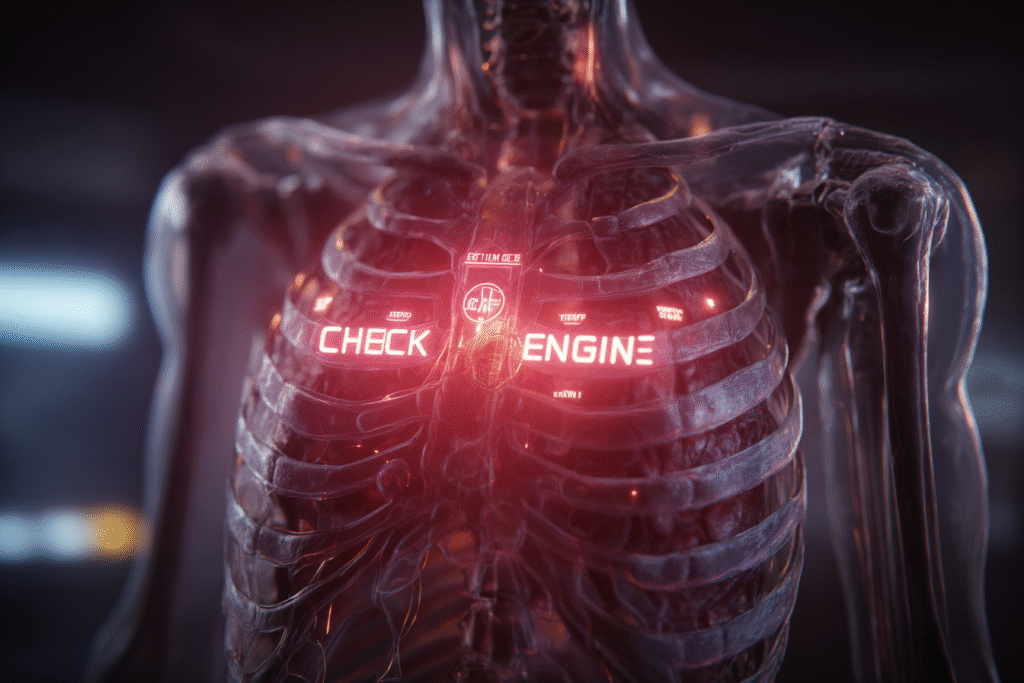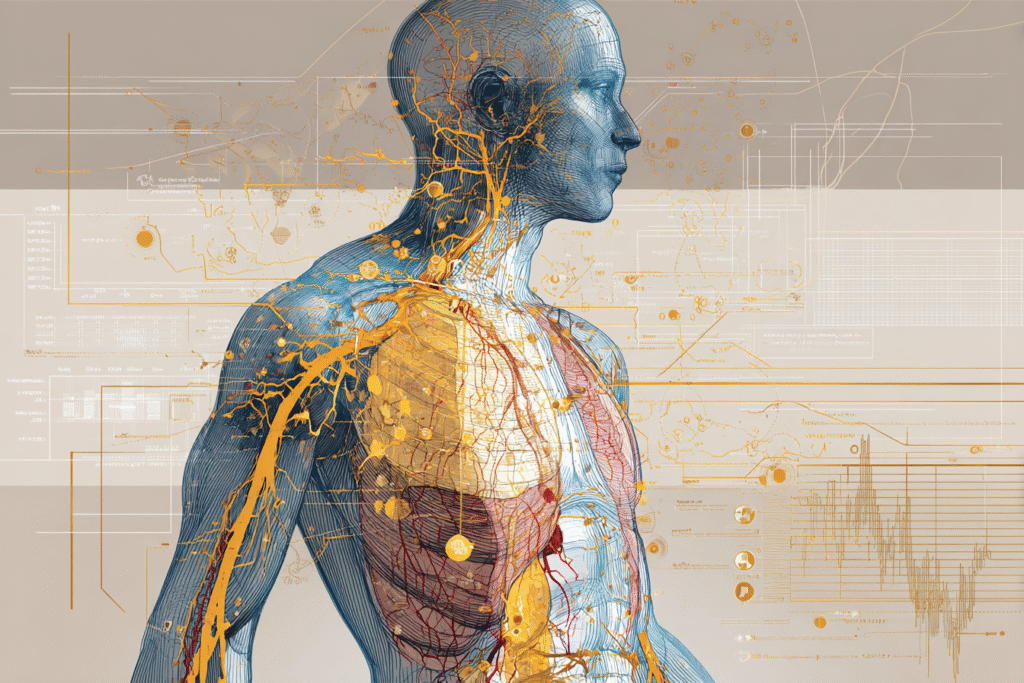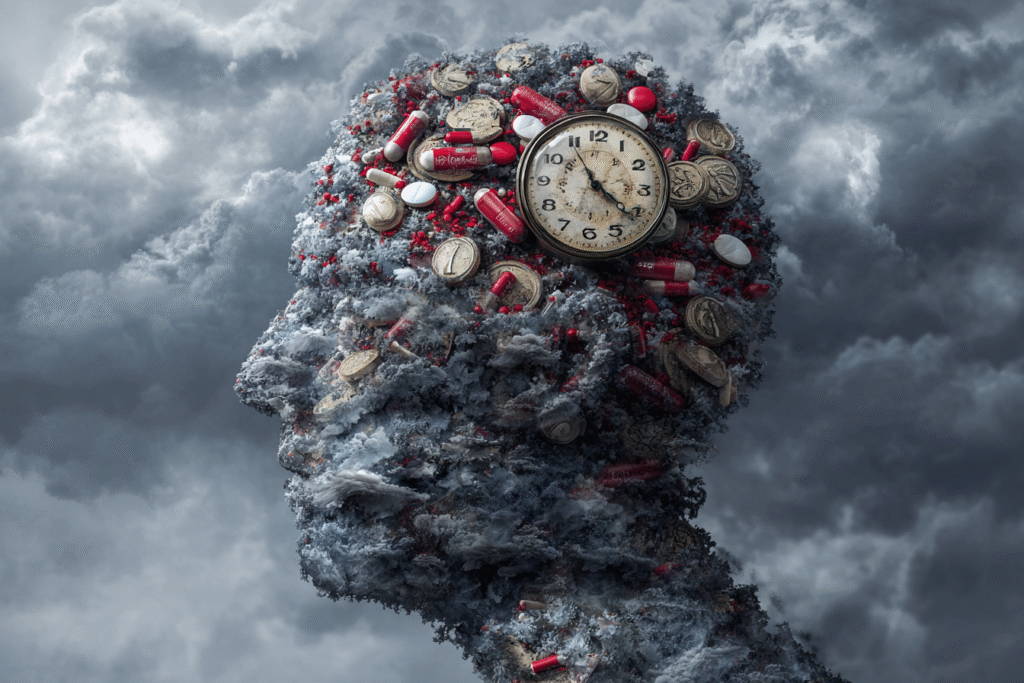Most people think the ER is where health crises begin. It’s actually where they end.
Note: This article is for educational and informational purposes only. See full disclaimer at the end.
I’ll never forget the moment I found myself in the emergency room with chest pain, convinced I was having a heart attack. After hours of tests and monitoring, the diagnosis was anxiety and acid reflux. “Everything looks normal,” the doctor said, handing me prescriptions for antacids and suggesting I “manage my stress.”
But here’s what the system missed: the chest pain was my body’s final warning after months of signals I’d been ignoring. The sleepless nights. The digestive issues. The constant tension in my shoulders. The growing sense of overwhelm. My body had been communicating clearly—I just hadn’t learned to listen.
This is reactive healthcare in action: wait until the crisis, treat the symptom, miss the message.
The Symptom Management Machine
Yesterday, we explored the health paradox—how we’ve achieved the most advanced healthcare in history while becoming the sickest people ever.
Today, we dig deeper into why this paradox exists: our entire healthcare system is built on a reactive, symptom-management model that fundamentally misunderstands how biological intelligence works.

Consider how this system operates:
- You feel tired? Here’s a stimulant.
- You can’t sleep? Here’s a sedative.
- You’re anxious? Here’s an anti-anxiety medication.
- Your blood pressure is high? Here’s a blood pressure medication.
- Your cholesterol is elevated? Here’s a statin, without exploring why.
Each fix targets the symptom while ignoring what your body is actually trying to say. It’s like disconnecting your car’s check engine light instead of looking under the hood.
The result? We’ve created a system that’s extraordinarily good at managing symptoms and terrible at addressing causes.
According to the latest CDC research, chronic disease affects 6 in 10 adults in the US, while 4 in 10 adults live with multiple chronic diseases¹. These aren’t sudden emergencies—they’re the end result of years of unheard biological signals.
The Avoidance Trap
But here’s the uncomfortable truth: we’re not just victims of a broken system. We’re active participants in perpetuating it.
Most of us live reactively. We ignore early signals—until they scream loud enough to stop us in our tracks. We postpone check-ups, avoid uncomfortable conversations with our bodies, and hope problems will resolve themselves.

Why do intelligent people consistently make this choice?
The Overwhelm Factor: Health optimization feels impossibly complex. With conflicting advice, endless supplements, and constantly changing recommendations, many people shut down rather than engage.
The Time Illusion: We tell ourselves we’re “too busy” to focus on health, not realizing that poor health will eventually consume far more time than prevention ever would.
The Fear Paradox: We avoid health attention because we’re afraid of what we might find, not recognizing that avoidance guarantees the very outcomes we fear.
The Expertise Trap: We’ve been conditioned to believe health requires expert intervention, disconnecting us from our body’s natural intelligence.
Research shows that health-related procrastination often stems from psychological factors including fear, overwhelm, and perfectionism—the same patterns that drive avoidance in other important life areas⁴.
When avoidance becomes a habit, it feeds the very system it tries to escape.
This avoidance psychology creates a perfect storm: we ignore signals until they become crises, then enter a system designed to manage symptoms rather than restore balance.
Your Body's Signal Intelligence
Here’s what the reactive model misses: your body is constantly communicating with you through a sophisticated biological intelligence system that makes our most advanced AI look primitive.
Every sensation, energy shift, sleep pattern, digestive response, and emotional state carries information about your current biological status and needs.
Your body doesn’t wait for a crisis to speak. It’s sending signals all the time.
The problem isn’t communication. It’s our ability to hear it.

Consider these common “early warning signals” that most people dismiss:
- Energy Patterns: Consistent afternoon crashes, difficulty waking up, or feeling tired despite adequate sleep
- Digestive Communication: Bloating, irregular patterns, food sensitivities, or digestive discomfort
- Sleep Signals: Difficulty falling asleep, staying asleep, or feeling unrefreshed upon waking
- Emotional Indicators: Increased irritability, anxiety, overwhelm, or difficulty managing stress
- Physical Tension: Chronic neck/shoulder tightness, headaches, or persistent muscle tension
- Cognitive Changes: Difficulty concentrating, memory issues, or mental fog
- Skin and Appearance: Changes in skin quality, unexplained rashes, or sudden hair texture changes
- Social and Behavioral Shifts: Withdrawal from activities you normally enjoy, changes in appetite, or increased reliance on stimulants/sedatives
In the reactive model, these signals are either ignored or medicated. But what if we viewed them as core data points in a conscious health system?
That shift begins with a new framework.
The True Cost of Reactive Thinking
The financial cost of reactive healthcare is staggering—Americans spent $4.9 trillion on healthcare in 2023, with most going to chronic disease management².

But the deeper costs are harder to quantify:
Energy Depletion: Living with unaddressed health issues drains your cognitive and emotional resources, limiting what you can create and contribute.
Relationship Impact: Poor health affects your capacity for presence, intimacy, and emotional availability with the people you care about most.
Opportunity Loss: Health challenges can derail career trajectories, travel plans, and life dreams that become impossible to pursue.
Generational Effects: The health patterns we model influence our children’s relationship with their bodies and well-being.
Consciousness Limitation: Perhaps most significantly, poor health constrains your consciousness—your ability to think clearly, feel deeply, and engage fully with life.
When we frame health reactively, we’re not just risking physical symptoms. We’re limiting our entire human potential.
The Conscious Health Framework
What would healthcare look like if we moved beyond symptom management to signal intelligence?
- Signal Awareness: Instead of waiting for symptoms, we develop sensitivity to our body’s continuous communication.
- Pattern Recognition: We track patterns over time rather than treating isolated incidents.
- Root Cause Investigation: We explore underlying factors contributing to signals rather than masking symptoms.
- Proactive Optimization: We make adjustments based on early signals rather than waiting for crises.
- System Integration: We consider the whole person—mental, emotional, physical, and spiritual—rather than isolated body parts.
This isn’t about becoming your own doctor or avoiding medical care when needed. It’s about developing the biological intelligence to partner effectively with healthcare when necessary while taking primary responsibility for your daily optimization.

Let me be clear:
Medical professionals aren’t the problem—the system’s limitations are.
Your doctor might see you once or twice a year for brief appointments, while you see yourself in the mirror multiple times daily. It’s your body, your mind, your health.
It’s simply impossible for any healthcare provider to fully understand your patterns, responses, and changes from a single annual visit—especially when most of us struggle to remember and communicate everything that’s happened since our last appointment.
This isn’t a failure of medical expertise; it’s a structural limitation that makes conscious self-monitoring not just valuable, but essential for effective healthcare partnerships.
Applied Signal Detection
Remember our signal detection work from previous explorations—the ability to recognize meaningful patterns in environmental and biological information?
The same principles that help you detect subtle changes in your consciousness and environment apply directly to health optimization:
- Environmental Scanning: How does your environment affect your energy, sleep, and well-being?
- Pattern Recognition: What consistent patterns can you identify in your health and energy?
- Signal vs. Noise: Which sensations carry useful information vs. random fluctuations?
- Response Calibration: How do different foods, activities, and choices affect your biological state?
Your body is continuously generating data about what supports or depletes your health. The question is whether you’re receiving and responding to that information.
This data collection isn’t meant to replace medical expertise—it’s meant to enhance it.
When you do see your healthcare provider, you’ll arrive with patterns, observations, and specific information that makes their expertise far more effective.
The most successful health outcomes happen when personal awareness meets professional knowledge.

The Conscious Health Transition
Moving beyond reactive healthcare isn’t about perfection or becoming a health fanatic. It’s about developing a more conscious relationship with your biological intelligence.
Start with these foundation principles:
- Listen Before Crisis: Pay attention to your body’s signals before they become symptoms requiring intervention.
- Track Patterns: Notice what consistently supports or depletes your energy and well-being.
- Optimize Rather Than Fix: Focus on creating conditions for health rather than just addressing problems.
- Integrate Systems: Consider how mental, emotional, and physical health interconnect rather than treating them separately.
- Partner with Professionals: Use healthcare professionals as partners in optimization rather than just crisis managers.
This approach doesn’t eliminate the need for medical care—it transforms your relationship with it. Instead of only engaging with health during crises, you become an active participant in continuous optimization.

Your Health Evolution
The reactive healthcare system isn’t going to change overnight. But your relationship with health can transform immediately.
Your body is the most advanced biological intelligence system ever built.
It constantly tells you what helps, what hurts, what lifts you up—and what brings you down.
The question isn’t whether your body is speaking. It’s whether you’re listening.
Listening to your body isn’t about fear or control.
It’s about respect. Respect for the intelligence that keeps you alive every day, and for the quiet signals that—if honored early—can change everything.
Tomorrow, we’ll explore how AI can become your partner in this conscious health transformation, amplifying your body’s signal intelligence with technological precision.
For now, consider this: what signals has your body been sending that you’ve been treating as noise rather than information?
See you in the next insight.
Comprehensive Medical Disclaimer: The insights, frameworks, and recommendations shared in this article are for educational and informational purposes only. They represent a synthesis of research, technology applications, and personal optimization strategies, not medical advice. Individual health needs vary significantly, and what works for one person may not be appropriate for another. Always consult with qualified healthcare professionals before making any significant changes to your lifestyle, nutrition, exercise routine, supplement regimen, or medical treatments. This content does not replace professional medical diagnosis, treatment, or care. If you have specific health concerns or conditions, seek guidance from licensed healthcare practitioners familiar with your individual circumstances.
References
- Hacker, K. The Burden of Chronic Disease. Mayo Clinic Proceedings: Innovations, Quality & Outcomes, 2024. https://www.ncbi.nlm.nih.gov/pmc/articles/PMC10830426/
- CMS Office of the Actuary. National Health Expenditure Data, 2023. Health Affairs, December 2024. https://www.cms.gov/data-research/statistics-trends-and-reports/national-health-expenditure-data/nhe-fact-sheet
- Multiple Chronic Conditions Study: Buttorff, Christine, Teague Ruder, and Melissa Bauman. “Multiple Chronic Conditions in the United States.” RAND Corporation, 2017. https://www.rand.org/pubs/tools/TL221.html
- Procrastination and Health Research: Sirois, Fuschia M. “Procrastination and Stress: Exploring the Role of Self-compassion.” Self and Identity 13, no. 2 (2014): 128-145. https://www.tandfonline.com/doi/abs/10.1080/15298868.2013.763404


